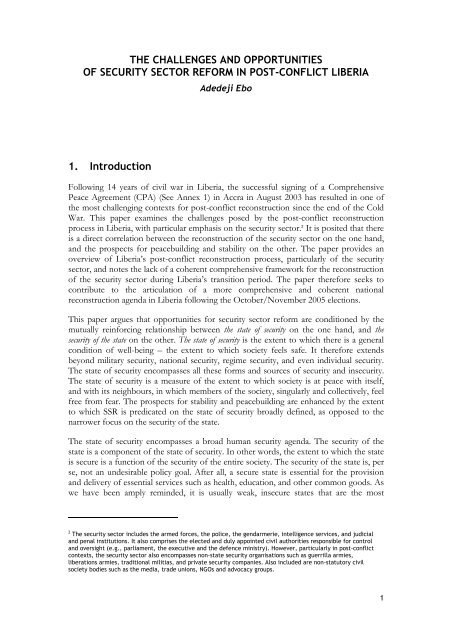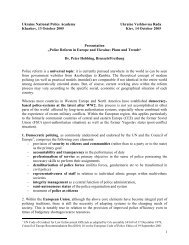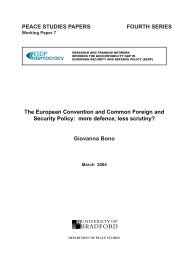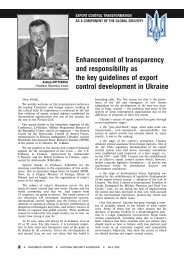The Challenges and Opportunities of Security Sector Reform in Post ...
The Challenges and Opportunities of Security Sector Reform in Post ...
The Challenges and Opportunities of Security Sector Reform in Post ...
You also want an ePaper? Increase the reach of your titles
YUMPU automatically turns print PDFs into web optimized ePapers that Google loves.
THE CHALLENGES AND OPPORTUNITIES<br />
OF SECURITY SECTOR REFORM IN POST-CONFLICT LIBERIA<br />
Adedeji Ebo<br />
1. Introduction<br />
Follow<strong>in</strong>g 14 years <strong>of</strong> civil war <strong>in</strong> Liberia, the successful sign<strong>in</strong>g <strong>of</strong> a Comprehensive<br />
Peace Agreement (CPA) (See Annex 1) <strong>in</strong> Accra <strong>in</strong> August 2003 has resulted <strong>in</strong> one <strong>of</strong><br />
the most challeng<strong>in</strong>g contexts for post-conflict reconstruction s<strong>in</strong>ce the end <strong>of</strong> the Cold<br />
War. This paper exam<strong>in</strong>es the challenges posed by the post-conflict reconstruction<br />
process <strong>in</strong> Liberia, with particular emphasis on the security sector. 2 It is posited that there<br />
is a direct correlation between the reconstruction <strong>of</strong> the security sector on the one h<strong>and</strong>,<br />
<strong>and</strong> the prospects for peacebuild<strong>in</strong>g <strong>and</strong> stability on the other. <strong>The</strong> paper provides an<br />
overview <strong>of</strong> Liberia’s post-conflict reconstruction process, particularly <strong>of</strong> the security<br />
sector, <strong>and</strong> notes the lack <strong>of</strong> a coherent comprehensive framework for the reconstruction<br />
<strong>of</strong> the security sector dur<strong>in</strong>g Liberia’s transition period. <strong>The</strong> paper therefore seeks to<br />
contribute to the articulation <strong>of</strong> a more comprehensive <strong>and</strong> coherent national<br />
reconstruction agenda <strong>in</strong> Liberia follow<strong>in</strong>g the October/November 2005 elections.<br />
This paper argues that opportunities for security sector reform are conditioned by the<br />
mutually re<strong>in</strong>forc<strong>in</strong>g relationship between the state <strong>of</strong> security on the one h<strong>and</strong>, <strong>and</strong> the<br />
security <strong>of</strong> the state on the other. <strong>The</strong> state <strong>of</strong> security is the extent to which there is a general<br />
condition <strong>of</strong> well-be<strong>in</strong>g – the extent to which society feels safe. It therefore extends<br />
beyond military security, national security, regime security, <strong>and</strong> even <strong>in</strong>dividual security.<br />
<strong>The</strong> state <strong>of</strong> security encompasses all these forms <strong>and</strong> sources <strong>of</strong> security <strong>and</strong> <strong>in</strong>security.<br />
<strong>The</strong> state <strong>of</strong> security is a measure <strong>of</strong> the extent to which society is at peace with itself,<br />
<strong>and</strong> with its neighbours, <strong>in</strong> which members <strong>of</strong> the society, s<strong>in</strong>gularly <strong>and</strong> collectively, feel<br />
free from fear. <strong>The</strong> prospects for stability <strong>and</strong> peacebuild<strong>in</strong>g are enhanced by the extent<br />
to which SSR is predicated on the state <strong>of</strong> security broadly def<strong>in</strong>ed, as opposed to the<br />
narrower focus on the security <strong>of</strong> the state.<br />
<strong>The</strong> state <strong>of</strong> security encompasses a broad human security agenda. <strong>The</strong> security <strong>of</strong> the<br />
state is a component <strong>of</strong> the state <strong>of</strong> security. In other words, the extent to which the state<br />
is secure is a function <strong>of</strong> the security <strong>of</strong> the entire society. <strong>The</strong> security <strong>of</strong> the state is, per<br />
se, not an undesirable policy goal. After all, a secure state is essential for the provision<br />
<strong>and</strong> delivery <strong>of</strong> essential services such as health, education, <strong>and</strong> other common goods. As<br />
we have been amply rem<strong>in</strong>ded, it is usually weak, <strong>in</strong>secure states that are the most<br />
2 <strong>The</strong> security sector <strong>in</strong>cludes the armed forces, the police, the gendarmerie, <strong>in</strong>telligence services, <strong>and</strong> judicial<br />
<strong>and</strong> penal <strong>in</strong>stitutions. It also comprises the elected <strong>and</strong> duly appo<strong>in</strong>ted civil authorities responsible for control<br />
<strong>and</strong> oversight (e.g., parliament, the executive <strong>and</strong> the defence m<strong>in</strong>istry). However, particularly <strong>in</strong> post-conflict<br />
contexts, the security sector also encompasses non-state security organisations such as guerrilla armies,<br />
liberations armies, traditional militias, <strong>and</strong> private security companies. Also <strong>in</strong>cluded are non-statutory civil<br />
society bodies such as the media, trade unions, NGOs <strong>and</strong> advocacy groups.<br />
1

















